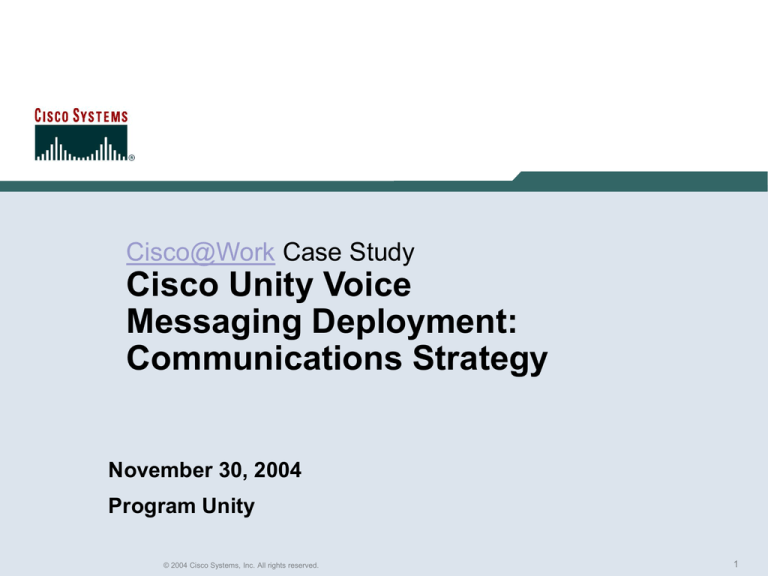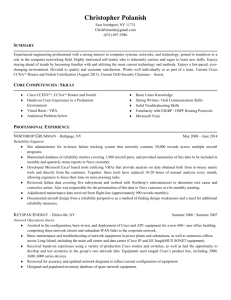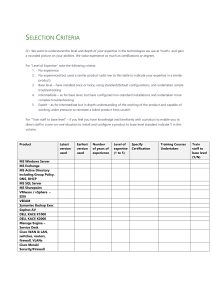
Cisco@Work Case Study
Cisco Unity Voice
Messaging Deployment:
Communications Strategy
November 30, 2004
Program Unity
© 2004 Cisco Systems, Inc. All rights reserved.
1
Overview
• Challenge
Develop communications solution to facilitate acceptance
and adoption of Cisco Unity® Voice Messaging by
approximately 35,000 Cisco® employees
• Solution
Create a global communications program, sourcing
consistent messages at the program level, while relying on
implementation teams to deliver locally, meeting unique
client needs for each region
• Next Steps
Capture feedback and analyze results from end-user
survey to assess effectiveness of program
communications and identify areas for improvements
© 2004 Cisco Systems, Inc. All rights reserved.
2
Background
• Program Unity is a joint initiative between Cisco® IT and the
Cisco Enterprise Communications Software Business Unit
(ECSBU) to globally replace the existing Avaya Octel voice
messaging system with Cisco Unity® Voice Messaging
• The Communications team took a global perspective, while
accommodating differences in culture, language, and user
preferences across the four Cisco global regions
• The Communications team collaborated with representatives
from the Product Technology Marketing Organization (PTMO)
and the ECSBU to create a global communications strategy
closely aligned with Cisco business objectives
© 2004 Cisco Systems, Inc. All rights reserved.
3
Challenges
• Facilitate user acceptance and adoption of Cisco
Unity® Voice Messaging
• Communicate potential user challenges
• Promote user enrollment
© 2004 Cisco Systems, Inc. All rights reserved.
4
Challenge─Facilitate User Acceptance and
Adoption of Cisco Unity Voice Messaging
• Develop communications solution to facilitate
acceptance and adoption of Cisco Unity® by
approximately 35,000 Cisco® employees
• Clearly communicate Program objectives and
status, as well as product information, including
system behavior and functional differences
• Create targeted communications for specific
audiences, accommodating employees’ different
uses of voice mail, depending on their
organizational roles
© 2004 Cisco Systems, Inc. All rights reserved.
5
Challenge─Communicate Potential User
Challenges
• Address the two possible challenges to users as
they migrate to the new Cisco Unity® system
Learning curve challenges
Interoperability challenges
• Communications team prepared a variety of
communications to address these challenges, as
well as reduce a potential increase in support calls
after each site cutover
© 2004 Cisco Systems, Inc. All rights reserved.
6
Challenge─Promote User Enrollment
• Enrollment in the Cisco Unity® system before cutover is
important for two reasons
Allows users to try system and training before system is “live”
Allows users to personalize their greeting and record their name
so callers addressing messages hear a confirmation of the
message recipient
• Program team set a goal to have 70% user enrollment before
cutover at Research Triangle Park and San Jose campus
implementation
• To meet this goal, prior to cutover implementation, site
program managers distributed frequent reminders
encouraging users to enroll in Cisco Unity system
© 2004 Cisco Systems, Inc. All rights reserved.
7
Solution
• Communications strategy
• Global communications plan
• Executive sponsorship
• Communications vehicles
• Feedback mechanisms
© 2004 Cisco Systems, Inc. All rights reserved.
8
Solution─Communications Strategy
• Source global communications
at the program level, but
implement locally using the
implementation teams
• Move targeted audiences to
appropriate positions on the
“commitment curve” with
strategic, well-timed messages
• Continuously improve messages
and communications by
incorporating user questions
and feedback after each site
deployment
© 2004 Cisco Systems, Inc. All rights reserved.
9
Solution─Global Communications Plan
• Plan was a comprehensive blueprint for
communicating messages to employee groups, as
well as a roadmap for the implementation team
• When planning, team considered user feedback from
a global survey about training and communications
Most users wanted minimal information to enroll and
become familiar with the Cisco Unity® system
Global Program Website chosen as channel for providing
deployment information and directing users to all Webbased training resources
• Plan included a matrix detailing audiences, key
messages for each audience, appropriate
communications vehicles, and delivery timing
© 2004 Cisco Systems, Inc. All rights reserved.
10
Solution─Executive Sponsorship
• Executive sponsorship is important to deployment success
because the technology must be linked to key business goals
and initiatives
By demonstrating that it has executive support, a program can
gain support from those affected by its deployment
Executive sponsors can help resolve high-level issues
• Communications team demonstrated executive sponsorship
with a few carefully chosen communications vehicles
Announcement from Cisco® CEO on intranet
Voice messages from executives to senior staff and executive
administrators
E-mail, cascaded from executives through their organizations
• Program team met regularly with executive sponsors to
provide current status, milestones achieved, and potential
issues
© 2004 Cisco Systems, Inc. All rights reserved.
11
Solution─Communications Vehicles
• Variety of media was used to convey messages
Program and services Websites
E-mail
Voice messages
Posters
Flyers
Badge cards
Articles, newsletters, presentations
• Communications team created a package of e-mail
and voice messages for implementation teams to
customize for individual site deployments
© 2004 Cisco Systems, Inc. All rights reserved.
12
Solution─Feedback Mechanisms
• User feedback is a good way to assess whether
communications are clear and effective
• User feedback was solicited using:
E-mail aliases set up for both the global program and
individual sites
Comments received about communications, enrollment
instructions, and training from early, smaller site
deployments
Phone interviews conducted with new Cisco Unity® users
A global survey, sent to all Cisco Unity users, asking about
their migration experience
© 2004 Cisco Systems, Inc. All rights reserved.
13
Next Steps and Anticipated Results
• Global implementation of Cisco Unity® Voice
Messaging began in June 2004. Since then,
approximately 19,568 users have been converted to
Cisco Unity Voice Messaging at 17 sites.
• In October 2004, the Communications team
distributed a survey to all new Cisco Unity users to
assess the effectiveness of program
communications and training. Initial results
indicate:
82% of respondents felt well- to very well-informed,
sufficiently in advance
79% felt the level of communications was just right
86% felt the Cisco Unity enrollment instructions were clear
© 2004 Cisco Systems, Inc. All rights reserved.
14
Resources
More information about Program Unity is
available at the following URLs:
• Cisco@Work Messaging page: This page also includes the other Cisco
Unity® deployment case studies in this series.
http://www.cisco.com/en/US/about/ciscoitatwork/index.html
• Steps to Success page: Intended as a step-by-step resource for Cisco
partners for selling and delivering service and support throughout the
network cycle. http://www.cisco.com/go/stepstosuccess
© 2004 Cisco Systems, Inc. All rights reserved.
15
This publication describes how Cisco has benefited from the
deployment of its own products. Many factors may have contributed to
the results and benefits described; Cisco does not guarantee
comparable results elsewhere.
CISCO PROVIDES THIS PUBLICATION AS IS WITHOUT WARRANTY OF
ANY KIND, EITHER EXPRESS OR IMPLIED, INCLUDING THE IMPLIED
WARRANTIES OF MERCHANTABILITY OR FITNESS FOR A
PARTICULAR PURPOSE.
Some jurisdictions do not allow disclaimer of express or implied
warranties, therefore this disclaimer may not apply to you.
© 2004 Cisco Systems, Inc. All rights reserved.
16




